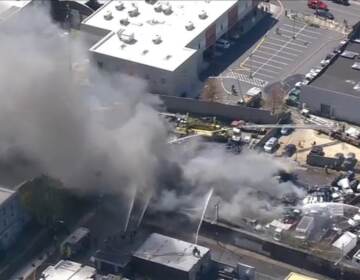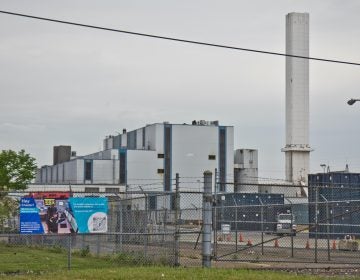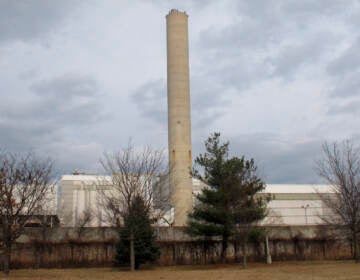After a junkyard fire pollutes Philly with smoke, city has few avenues for accountability
Philadelphia public health officials don’t plan to take punitive action against a construction waste processing facility for a fire that erupted last week.
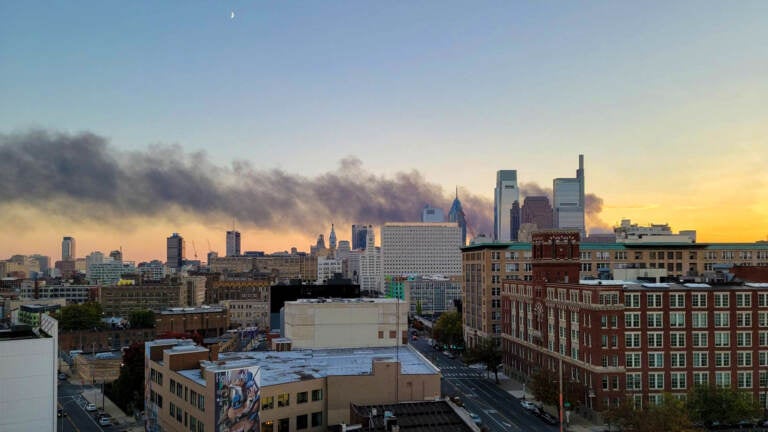
A tire fire in Southwest Philadelphia sent plumes of smoke across the city. (Mark Henninger/Imagic Digital)
Philadelphia public health officials don’t plan to take punitive action against the owners of a construction waste processing facility for a fire that blanketed much of the city in smoke last week.
The fire at Delaware Valley Recycling, Inc. that sent smoke across the city last Tuesday, causing people to have trouble breathing and vomit, is considered an “emergency incident,” said Sarah Peterson, deputy communications director in the Mayor’s office, in an email. Air Management Services, a division of the city’s Department of Public Health, does not issue notices of violation for such incidents, she said.
The facility at the intersection of 61st Street and Lindbergh Boulevard is permitted as a construction and demolition waste processing facility by the state. The Department of Environmental Protection inspected the facility Nov. 3 — less than a week before the fire — after a waste hauler called to ask the state agency whether they could take waste to the site. DEP spokesperson Virginia Nurk said inspectors checked to see whether the facility was storing too many tires, but found waste storage and processing at the site were in line with the facility’s permit, which allows it to accept up to 4,500 tons of waste per day.
Nurk said it’s too early to determine whether the facility could face penalties from the state, because investigators with the city Fire Marshal’s Office have not yet figured out the cause of the fire. If this investigation turns up a violation of the facility’s state permit, the company’s owners could face penalties from the state but this seems unlikely, given the results of the facility’s recent inspection.
As city officials investigate, one potential pain point for the facility’s owners may be the towering piles of junk tires and debris that went up in flames — and appeared to violate the Philadelphia fire code.
Capt. Derek Bowmer, a spokesperson for the Philadelphia Fire Department, told PlanPhilly that the piles of tires and construction debris reached four to five stories, or about 40 feet high. The city’s fire code limits tire storage piles to just 10 feet in height.
Firefighters brought the fire under control within hours, but continued to douse the burning piles with water for two days to prevent rekindling. Bowmer says they worked with the owner of the facility to spread the junk out and wet it all down.
Peterson, the city spokesperson, said the city’s Department of Licenses and Inspections has begun inspecting for fire code compliance. If L&I issues fire code violations, the facility will have time to address the violations and come into compliance before fines start to accrue.
Operators of a junkyard in Kensington that erupted in a four-alarm fire in 2018 faced a multi-million dollar fine stemming from fire code violations the city claimed went back years. Through a settlement process, the junkyard operators got that fine down to just around $100,000.
Another ‘toll’ on a community burdened by pollution
Jacqueline Newsome, who lives near Delaware Valley Recycling in Southwest Philadelphia, said the facility should face consequences for the fire.
“It should have been a violation,” she said, reached by phone Tuesday. “Because [the fire] jeopardized a lot of people’s lives that live over here.”
Newsome lives in the Brady Veterans Center homes, less than half a mile away from the site of the fire on 61st Street. She has asthma and is still using her inhaler daily since the fire, experiencing hoarseness and coughing up phlegm at night. She says the facility should be forced to pay a fine for the fire.
“That took a toll on me,” she said. “It just caused a lot of problems, really, over here.”
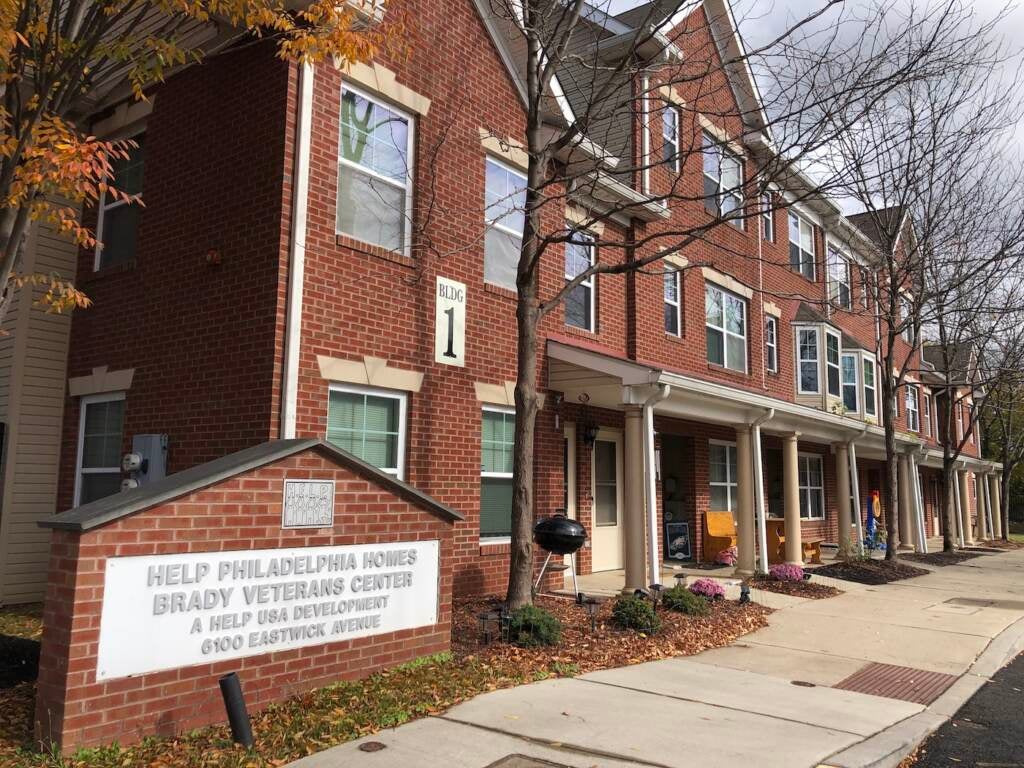
Phil Auld, an official at Delaware Valley Recycling, met with representatives of the city’s Department of Licenses and Inspection Tuesday, a company employee said. The employee, who declined to be quoted, disputed the fire department’s characterization of the tire piles.
Auld could not be reached for comment, but apologized to other media outlets last week.
“We’re certainly sorry for the fire here, and we’re doing everything in our power to clean up and get it behind us and be a good corporate citizen,” he told The Philadelphia Inquirer Thursday.
Peterson said L&I has never received a complaint about Delaware Valley Recycling.
The last large proactive scrapyard inspection L&I conducted was in 2018, Peterson said, during which the department inspected 115 properties and issued 330 violations.
But Newsome believes the safety issues extend well beyond the scrap businesses and relate back to a larger pattern of neglect in the area, a working-class corner of the city where industry and residences, many of them publicly subsidized, have long mingled and not always beneficially.
Lined with junkyards and auto shops, 61st Street, where Delaware Valley Recycling is located, operates as a busy industrial corridor. Yet for the people who live close by, most of them Black and brown, according to census data, it can feel like the city has abandoned them to the entrepreneurial instincts of people who leave junked cars stored in medians, illegally dump waste, and flout rules meant to prevent fires and protect people from toxic fumes and fluids.
“What if a car blows up down there,” Newsome said, referring to 61st street. “Or somebody set them on fire?”
In response to the high levels of illegal dumping on the street, the city has installed cameras and targeted enforcement through a cross-departmental effort called the Southwest Philly Auto Project. After months of inspections, officials issued several cease-operations orders after finding 40% of operations they inspected were not complying with city regulations.
Businesses that buy or sell tires will need to meet additional requirements at the end of this year, city officials point out. They’ll need to have a city-issued tire dealer license and record detailed information on each tire that arrives at or leaves their premises and the state-licensed waste hauler transporting it.
L&I has visited dozens of businesses to tell them about the upcoming licensing requirement and how to comply, Peterson said.

Subscribe to PlanPhilly
WHYY is your source for fact-based, in-depth journalism and information. As a nonprofit organization, we rely on financial support from readers like you. Please give today.







